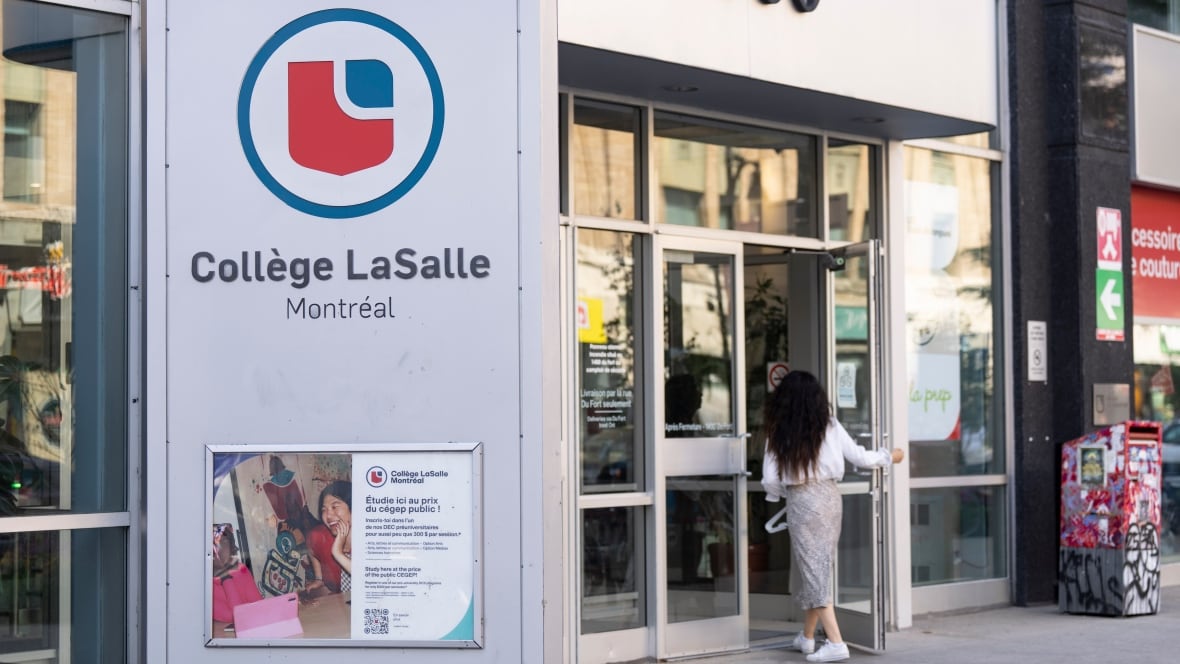Education
LaSalle College Alters Student Status Amid Language Reform Crisis

Students at LaSalle College in Montreal are facing significant disruptions just weeks before the start of the academic year. In a shocking turn of events, dozens have been shifted from full-time to part-time status as the college scrambles to comply with Quebec’s new language regulations. This change comes less than a month before classes are set to begin, creating uncertainty for many students.
Alex Abraham, a 33-year-old student entering the final year of his network management program, expressed his dismay at this last-minute alteration to his academic status. “I was shocked,” he stated in response to an email he received last week notifying him of the change. “We all came here with lots of expectations and dreams.” For international students like Abraham, this transition is particularly troubling, as part-time status disqualifies them from Canada’s post-graduation work permit and restricts their ability to work off-campus unless they meet specific conditions.
The college has indicated that approximately 90 students will be affected by this measure, which pertains only to the upcoming fall semester. In a statement, Caroline Gervais, a spokesperson for LaSalle College, explained that the changes are necessary to ensure compliance with the Charte de la langue française and the government-imposed quotas on English-language vocational programs, known as AEC programs.
The college has faced significant penalties in recent years due to over-enrollment in its English-language programs, with the Quebec government imposing fines totaling nearly $30 million. During the 2024-25 academic year, LaSalle exceeded the quota by 1,066 students, leading to a fine of $21,113,864 in addition to a prior fine of $8.7 million. The college is currently challenging these fines in a civil lawsuit filed in Quebec’s Superior Court.
Abraham, who moved from India to pursue his studies, commented on the impact of the change: “How can I meet my expenses? So suddenly if they change my enrolment into part-time, that’s obviously going to affect me very badly, so I’m concerned.” He noted that he had anticipated a resolution to the college’s issues, but did not foresee the unilateral change to his course load.
In light of the recent developments, LaSalle College acknowledged that various factors, including student performance and scheduling challenges, have influenced their ability to accommodate students as full-time learners. Gervais emphasized that the change in status does not reflect an overall exceeding of the AEC quota but rather the complexities of managing program capacities and academic pathways.
The situation has also raised concerns regarding the support for international students. Many, like Abraham, are navigating their educational aspirations alongside financial pressures and immigration status implications. “We are all putting the effort to learn the language and also trying to build a career here,” he noted, expressing a commitment to integrating into Quebec culture.
In response to the widespread concern, LaSalle College organized a meeting for affected students with representatives from Immigration Canada. Abraham hopes the meeting will clarify the reasons behind the changes, stating, “I have the right to know the reason.” He expressed frustration at the possibility that the college’s actions are merely an attempt to avoid further fines, asserting, “I am not the reason for the fine. They did the wrong thing; they violated the rule.”
As the academic year approaches, LaSalle College’s efforts to comply with provincial regulations while addressing the needs of its students remain under scrutiny. The outcome of this situation will be closely watched by both students and the wider educational community as they navigate the complexities of Quebec’s language policies.
-

 Science1 week ago
Science1 week agoMicrosoft Confirms U.S. Law Overrules Canadian Data Sovereignty
-

 Technology1 week ago
Technology1 week agoGoogle Pixel 10 Pro Fold Specs Unveiled Ahead of Launch
-

 Technology1 week ago
Technology1 week agoWorld of Warcraft Players Buzz Over 19-Quest Bee Challenge
-

 Science5 days ago
Science5 days agoChina’s Wukong Spacesuit Sets New Standard for AI in Space
-

 Health6 days ago
Health6 days agoRideau LRT Station Closed Following Fatal Cardiac Incident
-

 Science1 week ago
Science1 week agoXi Labs Innovates with New AI Operating System Set for 2025 Launch
-

 Lifestyle6 days ago
Lifestyle6 days agoVancouver’s Mini Mini Market Showcases Young Creatives
-

 Science1 week ago
Science1 week agoInfrastructure Overhaul Drives AI Integration at JPMorgan Chase
-

 Technology1 week ago
Technology1 week agoHumanoid Robots Compete in Hilarious Debut Games in Beijing
-

 Top Stories1 week ago
Top Stories1 week agoSurrey Ends Horse Racing at Fraser Downs for Major Redevelopment
-

 Technology1 week ago
Technology1 week agoNew IDR01 Smart Ring Offers Advanced Sports Tracking for $169
-

 Technology5 days ago
Technology5 days agoDragon Ball: Sparking! Zero Launching on Switch and Switch 2 This November
-

 Health6 days ago
Health6 days agoB.C. Review Urges Changes in Rare-Disease Drug Funding System
-

 Technology1 week ago
Technology1 week agoGlobal Launch of Ragnarok M: Classic Set for September 3, 2025
-

 Technology1 week ago
Technology1 week agoFuture Entertainment Launches DDoD with Gameplay Trailer Showcase
-

 Business6 days ago
Business6 days agoCanadian Stock Index Rises Slightly Amid Mixed U.S. Markets
-

 Science1 week ago
Science1 week agoNew Precision Approach to Treating Depression Tailors Care to Patients
-

 Education5 days ago
Education5 days agoParents Demand a Voice in Winnipeg’s Curriculum Changes
-

 Technology1 week ago
Technology1 week agoInnovative 140W GaN Travel Adapter Combines Power and Convenience
-

 Business1 week ago
Business1 week agoNew Estimates Reveal ChatGPT-5 Energy Use Could Soar
-

 Health5 days ago
Health5 days agoRideau LRT Station Closed Following Fatal Cardiac Arrest Incident
-

 Business5 days ago
Business5 days agoAir Canada and Flight Attendants Resume Negotiations Amid Ongoing Strike
-

 Health1 week ago
Health1 week agoGiant Boba and Unique Treats Take Center Stage at Ottawa’s Newest Bubble Tea Shop
-

 Business1 week ago
Business1 week agoUkraine Strikes Lukoil Refinery, Halting Operations Amid Conflict










